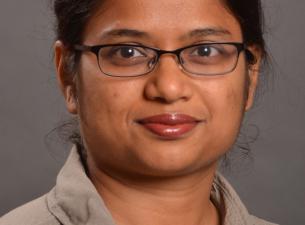YSU prof wins prestigious NSF grant for cutting-edge eye-tracking research

A Youngstown State University Computer Science professor is the first faculty member in YSU history to win the National Science Foundation’s highly competitive CAREER Award for Early Career Development.
Bonita Sharif, an associate professor of Computer Science and Information Systems who joined YSU’s College of Science, Technology, Engineering and Mathematics in 2011, will receive a five-year, $416,000 federal research grant. The award is considered the NSF’s most prestigious honor for junior faculty nationwide.
"This national recognition speaks to Dr. Sharif’s expertise and her growing prominence in her field," Provost Martin Abraham said. "It's also another indicator of YSU's rising reputation as an emerging research institution with vibrant, talented faculty who benefit our students, their disciplines and our community."
Kriss Schueller, professor and chair of CSIS, said Sharif’s accomplishment reflects positively on the department and the university as a whole. “I am extremely proud of Bonita’s work,” he said. “She is building an excellent reputation in the community, and this award is a clear, national verification that valuable research is going on in CSIS.”
Sharif’s research is focused on the use of eye-tracking technology to understand software development that could help build better tools for developers. Grant dollars will purchase the latest in eye-tracking equipment, will pay students assisting with the project and will fund a K-12 school outreach program.
“Eye tracking has been around forever, since the 1800s,” she said, explaining how the technology assists people with disabilities in reading and communications. “But we’re using it in new ways to help software engineers solve problems. Only a handful of people in the world are doing this, but we’re hoping to change that.”
Her plans call for employing one graduate student and three undergraduate students per semester. “The students love working on these projects because they are task-based,” she said. “They’re excited about being involved in research and learning the process.”
Sharif believes the NSF liked her application because she provided plenty of research evidence to show that eye tracking can help improve the software development process. “We did a lot of groundwork to demonstrate that our ideas are feasible,” she said.
Earlier this month, Sharif chaired a software visualization conference in Raleigh, N.C., where she also introduced and demonstrated a new eye tracking software tool she and her students designed and developed at the Software Engineering Research and Empirical Studies lab at YSU. The tool, called “iTrace,” maps eye movements to elements in software artifacts automatically and on the fly. She is also collaborating with other researchers from USA, Columbia, Poland, Canada and Germany working on similar research.
A native of India, Sharif said her childhood dream was to come to the United States. “I love it here,” she said. “It is the land of opportunity!”
She earned an undergraduate degree in Computer Science from Cyprus College on the island of Cyprus, where she also met her husband, a native of Bangladesh. Together, they came to Ohio to study at Kent State University (KSU), where she earned a master’s and PhD, also in Computer Science. She taught as a graduate assistant at KSU and spent a year as an adjunct faculty member at Ohio University before coming to YSU.
